Expanding into China presents a huge opportunity for global businesses — but it also comes with unique challenges. Strict data residency laws, local platform integrations, and regulatory compliance requirements make operating in the region complex. For multinational companies, navigating this environment is a key part of a successful digital transformation strategy.
With the general availability of Salesforce on Alibaba Cloud (as of December 2023), businesses now have a way to navigate these challenges while leveraging the power of Salesforce’s CRM tools.
Salesforce hosted on Alibaba Cloud provides the core CRM capabilities, including Sales Cloud, Service Cloud, and Salesforce Platform, all while meeting China’s regulatory requirements. Salesforce on Alibaba Cloud also includes features exclusive to mainland China, including the CXG (Connected Experience Gateway) and offers exclusive integrations with key platforms like WeChat and AliPay — which are essential for customer engagement and payments in the region. These integrations are also critical for companies looking to expand using Salesforce social commerce strategies in China.
But how do you migrate your existing Salesforce environment to Alibaba Cloud successfully? In this post, we’ll explore the key benefits, potential migration challenges, and how Gearset can help migrate your orgs to be hosted on Alibaba Cloud.
Standardizing Salesforce delivery in Manufacturing: Lessons from a release team
What is Alibaba Cloud?
Alibaba Cloud (also known as Aliyun) is the cloud computing division of Alibaba Group, providing a range of cloud-based services similar to AWS, Microsoft Azure, and Google Cloud. It’s one of the world’s largest cloud service providers and the leading cloud provider in China.
Alibaba Cloud provides services across:
- Computing & Storage: Virtual machines, elastic compute, and scalable cloud storage.
- Big Data & AI: Machine learning, data analytics, and AI-driven services.
- Security & Compliance: Encryption, threat detection, and compliance with Chinese regulations.
- Networking: Global and multi-region cloud networking solutions.
- Databases: Relational and NoSQL databases optimized for high performance.
China’s regulations prevent foreign SaaS companies from operating independently. Salesforce and Alibaba Cloud provide businesses with a way to operate in China while staying compliant with local laws. This partnership ensures that companies can leverage Salesforce’s CRM capabilities while benefiting from Alibaba Cloud’s infrastructure, security, and compliance mechanisms. The cloud computing, storage, and compliance mechanisms are Alibaba’s, but the user experience is still Salesforce’s UI.
This collaboration helps companies meet China’s strict data residency requirements, including data localization laws, which mandate that certain data remain within the country. By hosting Salesforce on Alibaba Cloud, businesses can ensure compliance while leveraging Salesforce’s core capabilities.
Salesforce on Alibaba Cloud also integrates with key local platforms, including WeChat for social and messaging, AliPay for payments, and other essential services tailored to the Chinese market.
What are the benefits for businesses in China?
Salesforce in China offers the same powerful CRM tools that businesses rely on worldwide but with China-specific integrations, compliance, and optimized performance. Adapting business processes to meet regulatory and market demands is crucial for success.
Optimized System Performance: Alibaba Cloud delivers high-performance computing, fast data processing, and a low-latency network to support real-time operations. Its robust infrastructure ensures reliability, scalability, and seamless user experiences, even under heavy workloads.
Built-in Compliance for China: Alibaba Cloud helps businesses meet strict data residency and security requirements, including China’s Cybersecurity Law and Personal Information Protection Law (PIPL). Regulations set by the Cyberspace Administration of China (CAC) govern how businesses store and process data, ensuring that sensitive information remains within the country.
Seamless Scalability: With flexible cloud infrastructure, businesses can scale resources as needed — whether handling traffic spikes, expanding operations, or optimizing costs. Alibaba Cloud’s auto-scaling, multi-region deployment, and elastic computing ensure smooth growth without infrastructure constraints.
Which Salesforce Clouds are available on Alibaba Cloud?
Salesforce currently offers three of their core clouds on Alibaba Cloud:
Salesforce Sales Cloud: A sales platform designed to help teams identify leads, manage customer relationships, track sales progress, and automate workflows — enabling faster deal closures and revenue growth.
Salesforce Service Cloud: A customer service platform that enhances every interaction, from engagement and automation to service operations. It includes pre-built applications, ticket management, a knowledge base, and queue management to streamline support.
Salesforce Platform: A low-code application development platform that extends CRM capabilities. Businesses can build, test, and deploy applications to automate processes, improve efficiency, and tailor workflows to their unique needs.
Salesforce has said that they plan to keep up with China’s dynamic, fast-paced markets, to continually build out the platform to offer additional integrations, storefront options, and possibly other clouds. Future enhancements may cater more directly to e-commerce businesses looking to expand in China.
Salesforce data and metadata migration challenges
Migrating your existing org is a complex process. While some challenges may be familiar, others are unique to moving to Alibaba Cloud and will require careful planning.
Metadata migration considerations
Start by analyzing your existing Salesforce org to identify core metadata elements that must be migrated. Not all metadata is supported on Alibaba Cloud, so careful selection is key. This is where a comparison tool can be helpful to allow you to analyse your metadata and its dependencies.
Not everything in your org can be migrated, so it’s not just a case of copying over the entire org’s metadata and then removing parts you don’t want later — your approach must be additive from the start.
Also remember that not all of the metadata you’re currently using in your org is guaranteed to be supported in a Salesforce environment on Alibaba Cloud, so this should also be factored into your analysis of your metadata. You should also define the “core” that you want to begin your migration with. For example:
Not all “standard” fields are standard in both, and if a field can’t be migrated, functionality that references it — like Apex triggers or JavaScript customizations — may need to be rebuilt.
Some platform components (Marketing Cloud, Commerce Cloud, CPQ, Field Service Lightning) or ISV packages might not be available on Alibaba Cloud at the point you’re making your migration.
Metadata and data must be migrated in the correct order. As metadata is the container for your data, this needs to be in place first to make sure your records are migrated successfully.
Data migration considerations
Data migration will be another major challenge. One of the key reasons you may be setting up a new org on Alibaba Cloud is to be compliant with data residency regulations as laid out in the Personal Information Protection Law (PIPL). PIPL is China’s data privacy law that governs how businesses collect, store, and process personal information. It sets strict requirements for data protection, user consent, and cross-border data transfers, ensuring that personal data is handled securely and remains within compliance.
With your org’s data migration there will be a process where existing records are transferred to the new org and removed from the original. Understanding the history of your org’s data and ensuring compliance with China-specific data regulations, such as PIPL, is essential.
How does Gearset integrate with Salesforce on Alibaba Cloud?
Using a custom client connection, Gearset is able to connect to orgs hosted on Alibaba Cloud. This allows Gearset users to compare the metadata contained within their orgs (regardless of whether they’re hosted on Alibaba Cloud or not) with a high level of detail, and to deploy across those environments. You can use Gearset to migrate metadata to Salesforce orgs on Alibaba Cloud and continue developing them post-migration.
Preparing to deploy metadata to a Salesforce org on Alibaba Cloud
As you plan your first deployment, you should identify characteristics of your existing org that form the “core” of your business’s data model. This core data model will be what you need to migrate to your new org hosted on Alibaba Cloud.
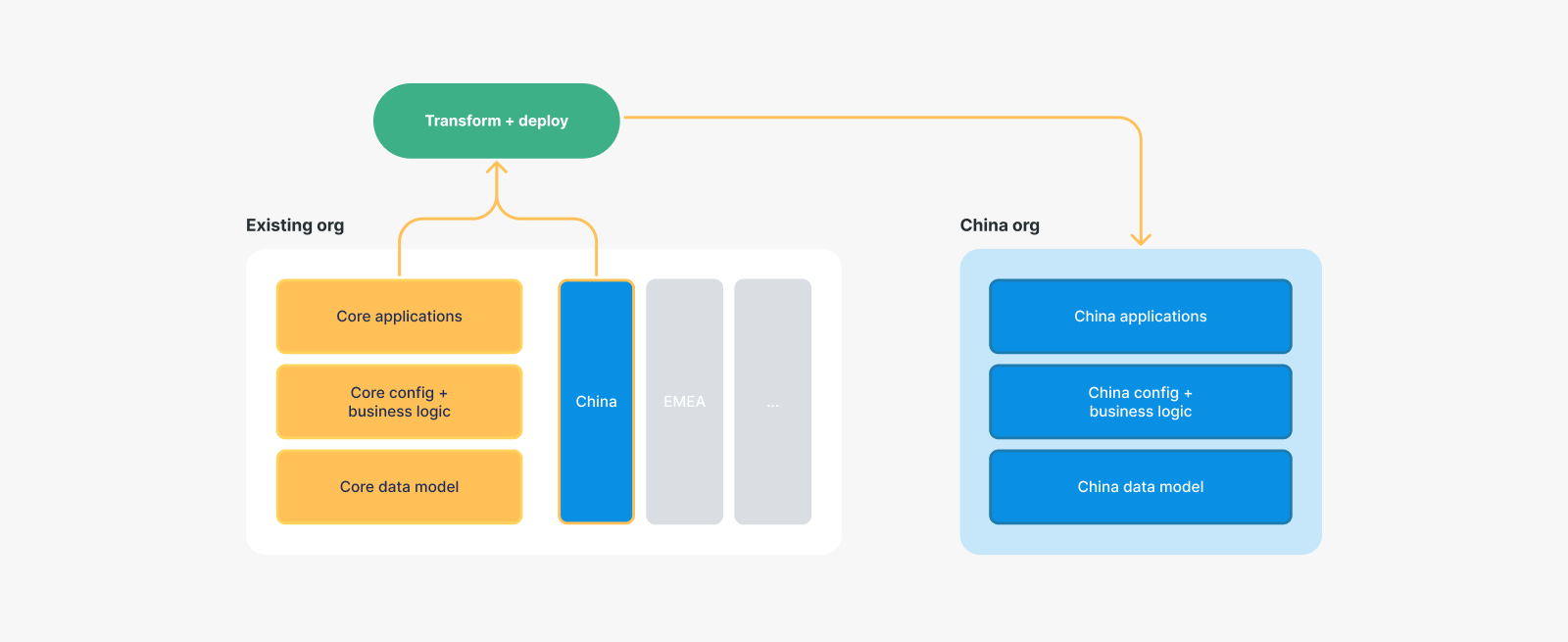
Preparing for your migration is crucial. You’ll need a deep understanding of your current Salesforce environment(s) before committing to the process of extracting the core data model. Gearset can help you achieve this with its detailed dependency analysis and comparison engine.
There are other important factors to take into account when going through your preparation phase, such as compliance, local user needs, and your own business requirements.
Alibaba cloud metadata deployment walkthrough
Deploying to your Alibaba-hosted Salesforce orgs is just as easy as any other Salesforce org. When you connect your org to Gearset, just make sure to specify that it’s an Alibaba Cloud connection. Once you’ve added the org as a connection, you’re ready to start your deployment.
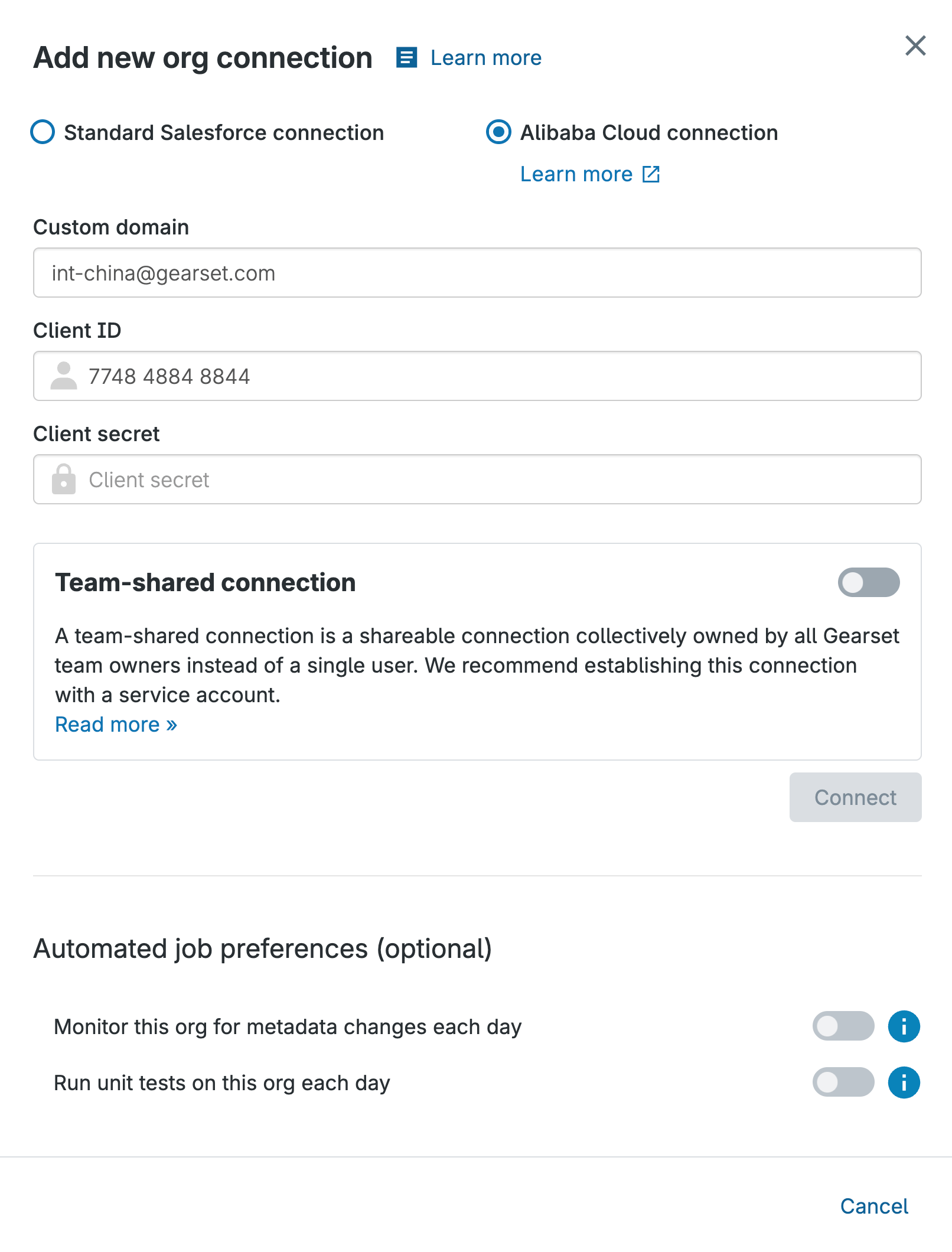
Select your source and target orgs
Select your source and target and click Compare now. You can select a specific comparison filter or select your metadata on demand.
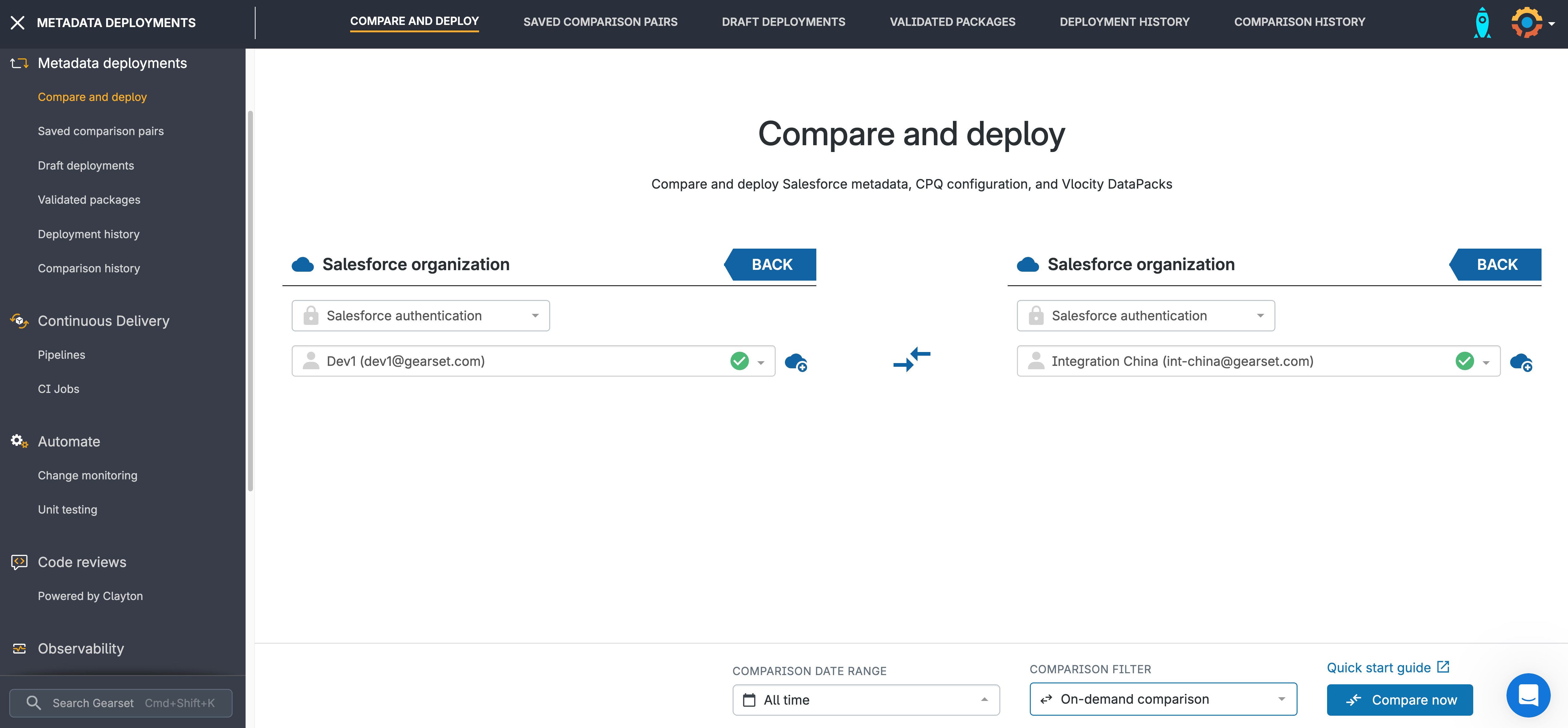
Compare your environments
Gearset will analyze the differences between your source and target org, highlighting all new, changed and deleted metadata items you’ve chosen in your filter. If you want to add any more types to the filter, you can choose them in the left-hand panel. Click Next.
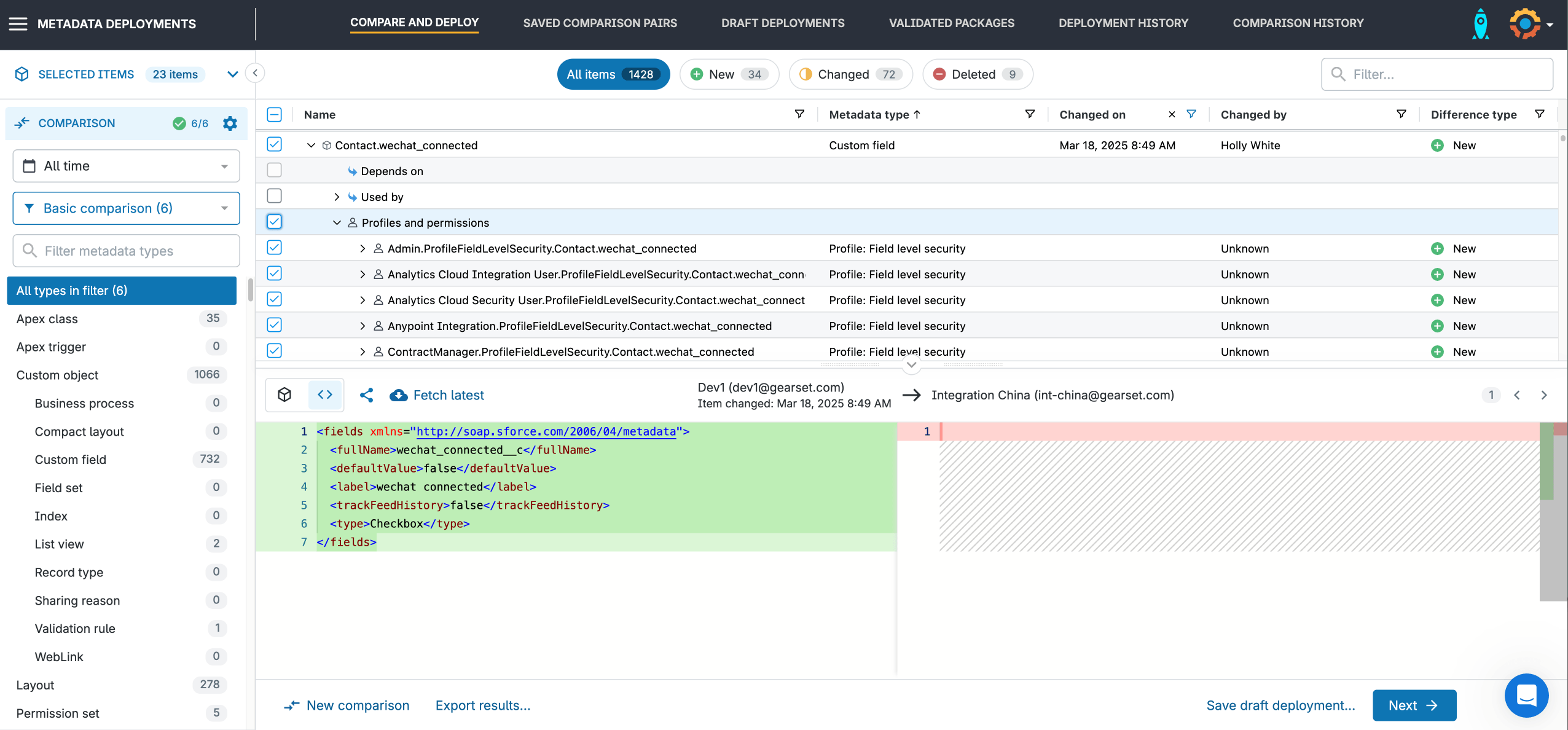
Run the problem analyzers
Gearset runs problem analysis on every deployment to look for issues that are likely to cause a deployment failure. You can accept recommended fixes to your deployment in one click, such as adding missing dependencies.
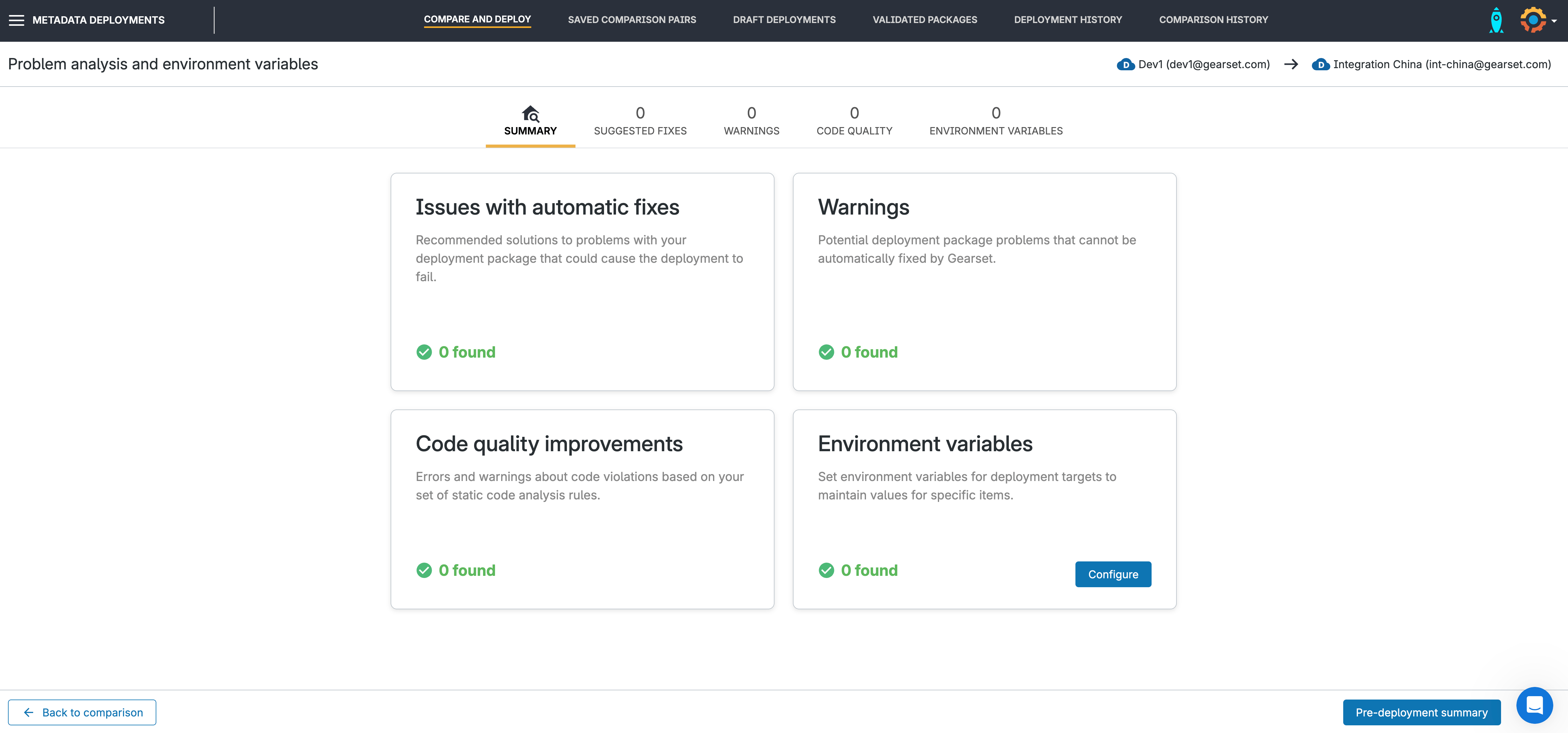
Pre-deployment summary
On the deployment summary page, give the deployment a friendly name for easy identification, include any deployment notes, and add the relevant user stories.

Finish your deployment
Validate your deployment, schedule it for later, or deploy it immediately — whichever fits your workflow. If you’re ready, hit Deploy now to complete your Alibaba Cloud deployment.
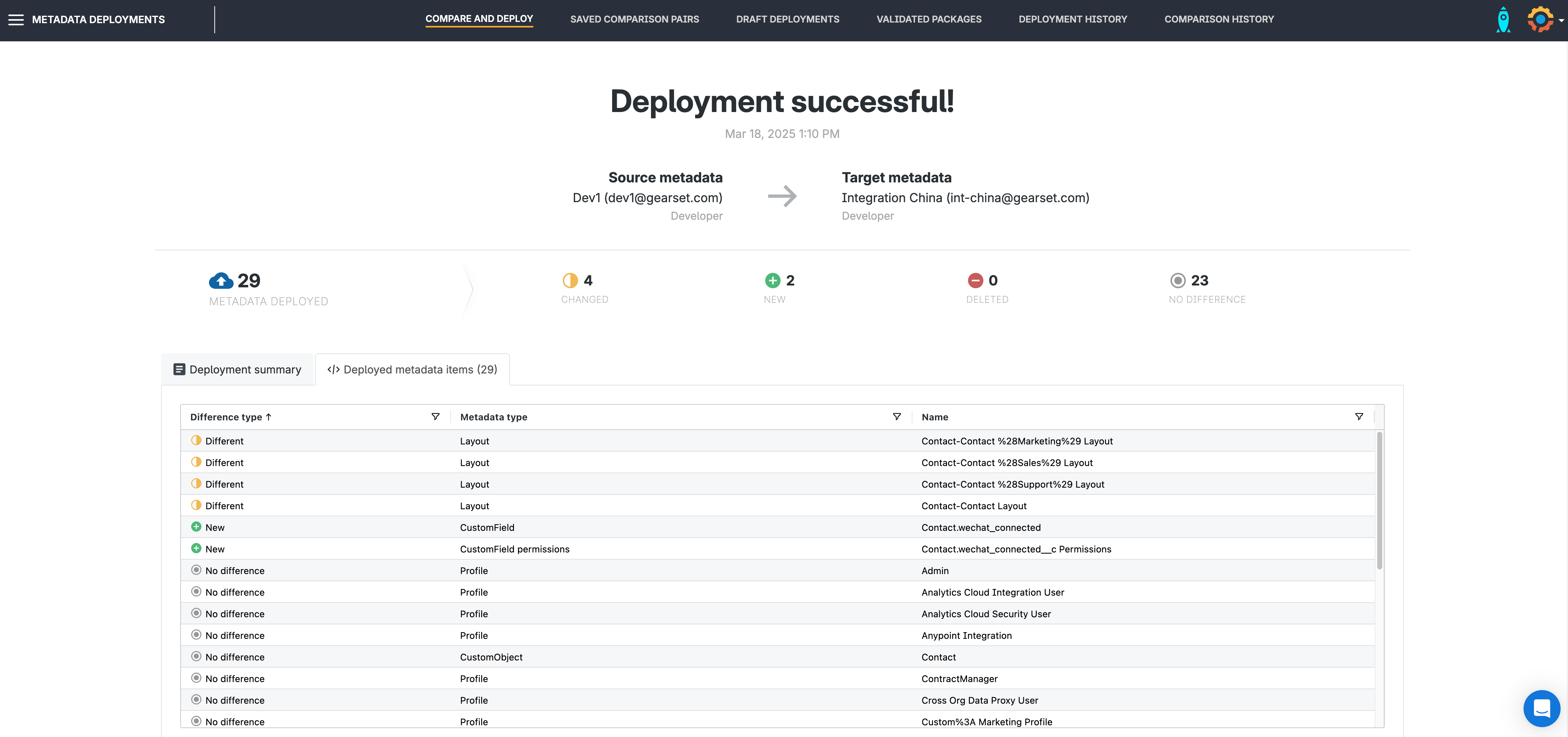
Planning your long-term Salesforce China DevOps strategy
Planning a long-term DevOps strategy is also essential. After migrating the metadata and data necessary for your new org’s function, you’ll need to develop it according to the needs of the overall business, as well as local market requirements.
Ongoing development
You should consider the implications of needing to update and maintain your core data model as part of the continuous development of your Salesforce landscape. As your business continues to evolve, there will be metadata requirements common to both orgs, so ensure that you have a process in place to deploy core changes without overwriting the org-specific development unique to each org.
Because many of the components of your org hosted on Alibaba Cloud are unique to the Chinese market, you will also need a process to develop and deploy these components without interfering with updates to your core data model.
Following the DevOps best practice of deploying small slices of work as often as possible, and automating quality gates for code quality and security will allow both orgs to be developed quickly. Continuous, high-quality peer review and feedback will be key to the creation of a robust DevOps process. If you’re not sure where to start check out this webinar on getting started with DevOps.
Integrating DevSecOps is also important to make sure security is embedded into the deployment process, reducing risks associated with compliance and unauthorized access.
Team structure and security
Visibility is essential for multi-org architecture with a shared data model. As the team responsible for planning and designing the metadata migration, you’ll have a clear understanding of what is and isn’t being migrated to your new org on Alibaba Cloud.
Maintaining that visibility across multi-region orgs can fall down the list of priorities post-migration, but we’ve found that teams who invest in maintaining that visibility and control are more successful long term.
One of the best ways to maintain long-term visibility is by structuring your team effectively. We recommend using a RACI matrix (Responsible, Accountable, Consulted, Informed), a project management tool that clearly defines roles, responsibilities, and task ownership across your team. The matrix helps highlight where you need to make changes by flagging tasks for team members.
Ask yourself these questions:
- Do we want a central change management board?
- Do we have a central review team for core changes vs local review teams for org-specific changes?
- How can we communicate most effectively to make sure the core data model of both orgs doesn’t drift?
The answers to these questions will be unique to your business, and we encourage thinking about these questions deeply as part of your long-term planning.
Org localization
There will be some differences in the org hosted on Alibaba Cloud. For instance, some standard fields may not align between your original org and the Alibaba Cloud org. Understanding these nuances is crucial for effective long-term DevOps planning.
Precision in metadata deployment is key to success. Clearly defining the impact of proposed changes — and whether they apply to one or both orgs — will streamline reviews and accelerate feedback loops. Businesses must also consider data segregation strategies to prevent unintended data access across environments.
Additionally, some functionality from your original org may need to be rebuilt to work with integrations exclusive to Alibaba Cloud, which may be unfamiliar. A strong DevOps strategy, focused on small, rapid updates and continuous feedback, will help navigate this process efficiently.
Rolling out Salesforce on Alibaba Cloud?
Migrating to Salesforce on Alibaba Cloud is a complex process, but with the right solution, it doesn’t have to be a headache. Gearset makes metadata and data migration seamless — book a demo to learn how we can help!



